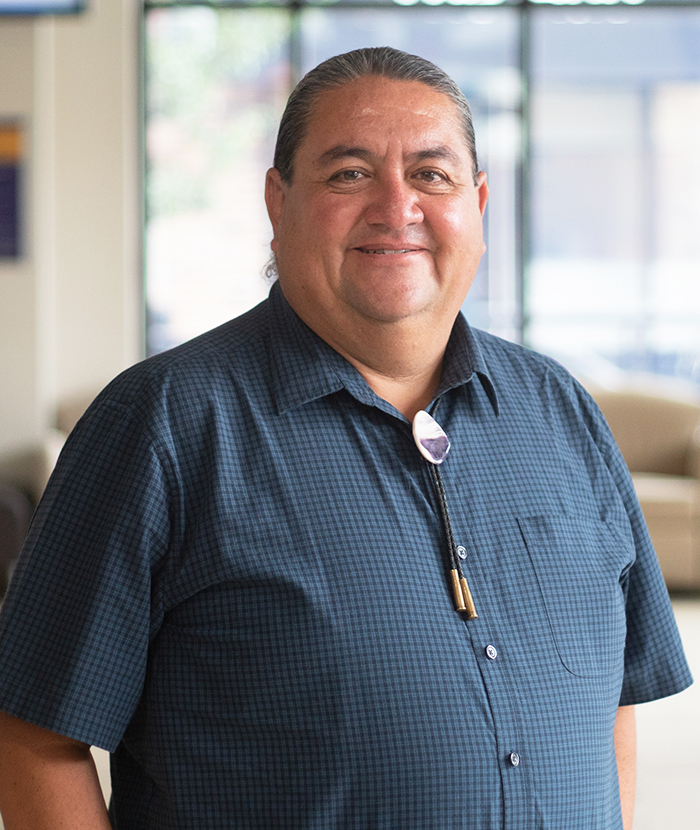Photography by Ian Maracle
Recently appointed Wilfrid Laurier University’s associate vice-president of Indigenous Initiatives, Darren Thomas brings a wealth of academic and lived experience to the role.
As Laurier’s most senior Indigenous leader, Thomas provides strategic advice, support and expertise to academic and administrative units across the university to achieve goals related to Indigeneity, including creating an environment of cultural safety for Indigenous faculty, staff, students and visitors. He is also working to guide the development of a university-wide Indigenization strategy, a core initiative in Laurier’s Action Plan for Equity, Diversity, Inclusion and Indigeneity.
A member of Seneca Nation from Six Nations of the Grand River Territory, Thomas first began working at Laurier in 2006 as the coordinator of community service-learning. Since then, he has held positions as an Indigenous Studies liaison officer and the university’s Aboriginal scholar in residence. Thomas completed his PhD in community psychology at Laurier in 2020 and is a tenured faculty member in the university’s Faculty of Liberal Arts.
Q: What opportunity do you see in the role of associate vice-president of Indigenous Initiatives at Laurier?

Darren Thomas was recently appointed Laurier’s associate vice-president of Indigenous Initiatives.
A: The opportunity I see in this new role is to really bring the skills of teaching through Indigenous thought and philosophy into and across the entire institution. There’s so much that we can make contributions to as Indigenous people. When this opportunity came up, I thought that there is so much we can do to build relations with and between the Indigenous community, mainstream society and the university. Intellectual contributions can be made by Indigenous peoples in every single discipline that we have at the university.
Q: How can the university help in advancing the goal of reconciliation with Indigenous peoples in Canada?
A: The goals of Indigenization and decolonization, reconciliation, these are huge goals. The Truth and Reconciliation Commission released its final report in 2015 and we’re still struggling with what reconciliation means as a country. Improving health and well-being is a significant step forward. This is where an educational institution like Laurier can step up and train its learners, Indigenous and allied learners alike, how they can contribute to the well-being of Canada, which must focus on the well-being of Indigenous peoples that have been left behind.
It’s going to take way beyond me as an individual, way beyond our staff team in the Office of Indigenous Initiatives and way beyond our Indigenous faculty. We need support from allied groups, all the staff and faculty, to pick up the same passion. And it must be intentional. When we’re looking at change, we must intentionally change.
Q: You earned your PhD in community psychology at Laurier. What inspired you to study the subject?
A: What community psychologists do is look at the health and well-being of a community, so it goes way beyond an individual person’s health. So, for me, it was a perfect fit with my work within the Indigenous community. There is no doubt that Indigenous populations have had significant adverse relations with the Crown because the Crown dictated and restricted our human rights for so long. And now that we’re trying to understand all of these laws that were in place and we’re trying to improve the quality of life for Indigenous peoples, we need intellectuals who can think and understand differently.
Q: Do you adhere to any guiding principles in your life and career?
A: Two of the things I’m all about are community and family. I was raised in a traditional community and culture at Six Nations with very strong values and principles about what it means to be a good human being. And wherever I’ve gone, no matter what I’ve done, that has been my primary focus – putting effort forward and enjoying life, celebrating life and honouring life as well.
Q: How has your lived experience as a member of Six Nations of the Grand River guided your teaching and interaction with students?
Darren Thomas, vice-president of Indigenous Initiatives
A: As a professor, bringing all of that lived experience into the classroom, students really enjoy my classes and the comments I hear back from them are that they really appreciate the stories and experiences I am sharing. And that’s a unique approach to teaching. Not for me, of course. As an Indigenous person in Indigenous pedagogy, this is how our communities teach, through stories and lived experiences. That’s why elders are revered so much within our cultures. The belief is that the longer you have on this Earth, the more wisdom you acquire.
Q: How would you describe the level of support for Indigenous Initiatives at Laurier?
A: We are poised as a really key leader among institutions in Ontario and across the country when it comes to Indigenous Initiatives because we’ve got the commitment from senior leadership. We’ve got really strong support among allied staff and faculty who really are putting this commitment forward and want to advance and improve relations between Indigenous and non-Indigenous peoples. It’s exciting and a great place to be. I look forward to representing and supporting Indigenous and allied students, staff and faculty in our collective efforts to ensure a safe, respectful and honourable environment for us all to work and learn together.